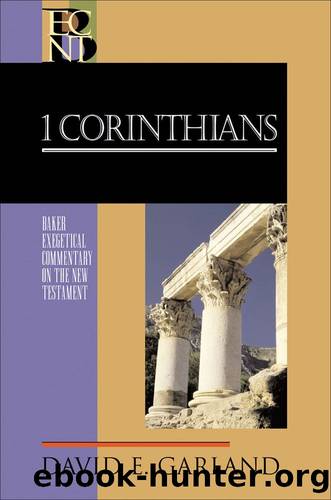1 Corinthians (Baker Exegetical Commentary on the New Testament) by Garland David E

Author:Garland, David E. [Garland, David E.]
Language: eng
Format: epub
Tags: REL006000, REL006070, REL006100
ISBN: 9781585583225
Publisher: Baker Publishing Group
Published: 2003-11-01T00:00:00+00:00
Paul expresses concern about the Christianâs witness to the unbeliever. The announcement presents an opportunity to expound oneâs faith in the one God and one Lord (see Godet 1887: 97).
[10:29bâ30] Paulâs sketchy description of the case makes it difficult to decide what the two rhetorical questions that follow in 10:29bâ30 mean in the context. D. Watson (1989: 308) calls them âthe major stumbling block to determining the flow of the argument in this section.â Several explanations have been proposed. Some can be quickly dismissed.
The claim that these questions are a marginal gloss added by an interpolator who wondered why the scruples of others should be allowed to restrict oneâs freedom and may have thought that Paul had gone too far (Weiss 1910: 265â66; Zuntz 1953: 17) is pure conjecture, without any supporting evidence. The confluence of vocabulary from chapters 8â10 in these verses argues strongly against this view.[14]
Some take these questions to reflect Paulâs self-defense of his own past actions, perhaps in Corinth, and claim that he anticipates some Corinthians challenging his own inconsistency in condemning them for eating idol food in temples while he ate the same idol food sold in the meat market. Fee (1987: 486) stresses the language âmy freedom,â âbeing judged,â and âbeing denounced,â and thinks that it recalls Paulâs defensive posture in 9:19â23. It is his âfinal word of defenseâ for eating idol foods on occasion (cf. Oropeza 1998: 57): âHe is as a Gentile to Gentiles, and as a Jew to Jews. He can either eat or not eat. But if he eats, he does so in light of the benediction of v. 26, and he is not to be condemned by anyoneâ (Fee 1987: 487). If chapter 9 is not a defense, as I contend, then this argument is weakened. I am convinced that Paul never ate idol food that was known to be idol food and so would have no need to defend himself. Paul may have used the âIâ âfor the sake of vividness when a more universal application is in viewâ (Wallace 1996: 391; cf. BDF §28), thus presenting himself as a paradigmatic example for his readers (B. Dodd 1999: 111; cf. 8:13).
Some assume that Paul addresses the so-called weak Christians to urge them not to abuse the forbearance of the so-called strong to judge them (Grosheide 1953: 244; Héring 1962: 99; Murphy-OâConnor 1978b: 555â56, 570â71; P. Richardson 1979: 129). This view presupposes a situation in which the strong and weak are squabbling, which I already have rejected, and there is no indication in the text that Paul changes tack to address a specific and narrower audience.
A more reasonable alternative assumes that Paul suddenly adopts a diatribe style by anticipating objections raised by the Corinthians. He imagines their rejection of such a restriction to their freedom (Lietzmann 1949: 52; Pierce 1955: 78; P. D. Gooch 1993: 92; Oster 1995: 250; Witherington 1995: 228; Soards 1999: 217): âWhy must the wings of our freedom be clipped by anotherâs conscience? Cannot our thankful attitude (cf.
Download
This site does not store any files on its server. We only index and link to content provided by other sites. Please contact the content providers to delete copyright contents if any and email us, we'll remove relevant links or contents immediately.
It's Never Too Late by Kathie Lee Gifford(541)
Hebrews, James by George H. Guthrie & George H. Guthrie(505)
The 9.9 Percent by Matthew Stewart(495)
Israel: Ancient Kingdom or Late Invention? by Daniel I. Block(490)
The New Oxford Annotated Bible with Apocrypha by unknow(474)
Take Back Your Time by Christy Wright(468)
Eating the Bible by Rena Rossner(467)
Psalms, Proverbs, Ecclesiastes, and Song of Songs by John W. Hilber & Tremper Longman III & Duane Garrett(451)
Insights on Hebrews by Charles R. Swindoll(450)
The Book Every Leader Needs to Read by 48 Authors(443)
Who Wrote the Bible? by Richard Elliott Friedman(399)
Commentary on the Torah by Richard Elliott Friedman(396)
The Jew in the Lotus by Rodger Kamenetz(393)
Judges: Volume Two by unknow(393)
Commentary on James (Commentary on the New Testament Book #16) by Robert H. Gundry(379)
NKJV, Ignite, eBook by Thomas Nelson(375)
Proverbs, Ecclesiastes, Song of Solomon (Ancient Christian Commentary on Scripture) by J. Robert Wright(364)
Job, Ecclesiastes, Song of Songs by August H. Konkel & Tremper Longman III(363)
Reading the Bible with Rabbi Jesus by Tverberg Lois(348)
